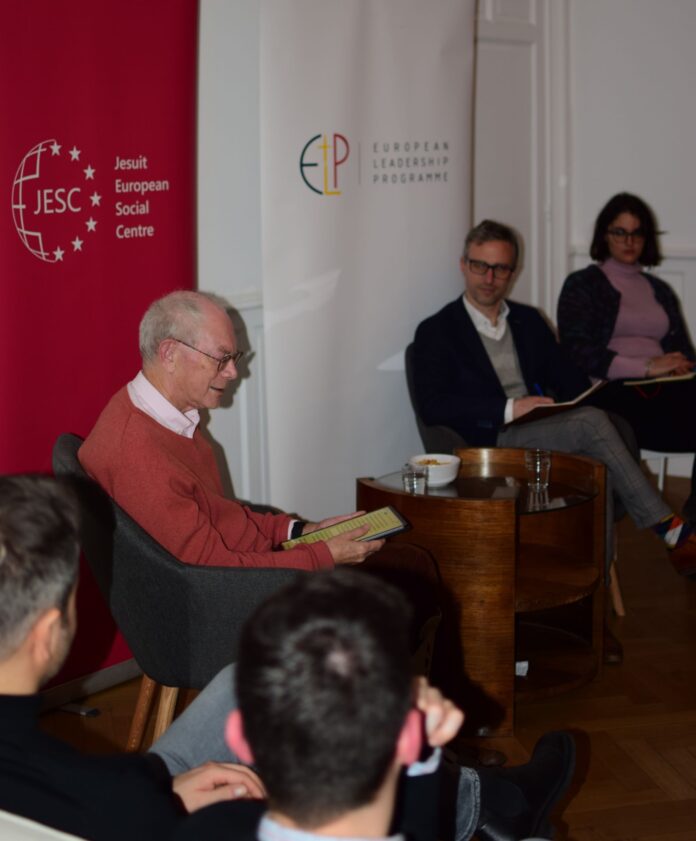Speaking notes from Herman Van Rompuy for the European Leadership Programme (ELP) – 11.01.2023
I am not looking for a scientific definition of leadership here. In any case, it is about someone who takes responsibility for a group, who tries to steer a private or public organisation in a certain direction with vision and persuasion. Political responsibility is then about the common good: what is best for society? The ‘bonum commune’.
Of course, I know that sometimes it can be about ‘power for power’s sake’, i.e. the personal interest or that of a clique, over the common good.
True leadership, then, is about values. We can speak of the latter as soon as it is about more than the Ego. Values are always about the others.
Leadership is not only about direction and about values but also about the means to get there. For this, one must appeal to the virtues best summarised by Aristotle and Cicero: fairness, courage, moderation and prudence. Let me add: leadership in a democratic society or organisation is about dialogue, conversation and the accompanying respect for each person.
A leader is also someone people trust. Trust is an almost indefinable concept. This is not to say that it is purely subjective. Trust is based on the tangible policy results the leader has achieved in the past, on his willingness to listen and his courage to take decisions, his persuasiveness, his vision. Without trust, almost nothing is possible. Distrust leads to fighting, standstill and even disintegration of the linkages. Inspiring trust is perhaps the most important capital of a leader.
This type of leadership has nothing to do with the authoritarian leader. His or her impact is not based on moral authority but on fear, terror or war that binds people to him or her. Through disinformation and manipulation, admittedly, a kind of temporary attachment can be created with a part of society. The leader does not want dialogue but obedience and submission. The leader does not want opposition, not even the slightest because it can grow into a real danger to him. Therefore, ruthlessness towards opponents is often a hallmark of the authoritarian leader.
There may also be intermediate forms in which the leader attempts to perpetuate his power by changing the rules of the game of democracy, by taking control of the media or by undermining the rule of law.
However, not every non-democratic regime is totalitarian. Think of the Church and many non-governmental organisations.
The political leader in an open society has accepted authority and political power. His power is based on authority. The latter comes from popular support following elections. The former is more of a sociological concept, the latter political. He is listened to, but there are predetermined limits to his authority. He has to earn that authority by results of policies and by the way they come about. The voter decides in the last resort whether he still has authority or not. Authority and power then hang together. In any case, any power is temporary in an open society. The authoritarian leader does not accept that temporality. It is only interested in political power not so much in authority.
Conversely, someone can have moral authority without political power. That too is not absolute and definitive.
Those with real authority and trust can stay in power longer and can more easily convince people even if difficult decisions have to be taken or even sometimes a U-turn. Those with credibility have more room to manoeuvre even if it is not infinite. Through personal qualities (charisma), a leader can increase that space but this too has an expiry date.
In a democratic organisation, there is an interaction between leader and citizens or voters. It is not about following or imposing. As mentioned, the final word is up to the voter but even the same voter can evolve through interaction with the leadership. Citizens may still accept originally unpopular measures through ‘advancing insight’ or the realisation that there are no alternatives to the policies pursued after all.
The statement ‘I am their leader, so I follow them’ implies that the leader does not take responsibility. I am talking here about the period between two elections. It sounds democratic but without dialogue and conversation, one does not achieve action in the service of the common good. Politics is action. Citizens are also often driven by their personal interest or that of their group or tribe and thus not the common good. The latter is a task of the leadership, the elected leadership but, as mentioned above, the last word still belongs to the citizens.
The populist leader is not after the general interest but that of his supporters. He secures that following by appealing to fear, often identitarian fear (the Muslims or the blacks will take power). In order not to lose that following, that kind of leader will rarely take unpopular measures towards his own group. In this sense, he follows. The populist is “courageous” towards others, the enemies.
Populists are more successful in times of confusion, uncertainty and fear. They weaken traditional parties, which then also have less room to show ‘leadership’, to take on responsibilities. It is also true that traditional politicians fall short by not taking the concerns of many sufficiently into account, by having a political agenda that is too far away from the common good. People then feel inadequately protected from real or perceived threats. Populists take advantage of this.
The ‘democratic deficit’ arises when citizens or part of them feel they have not been heard. Given the multiplicity of opinions in a democratic society, this feeling can arise without citizens agreeing among themselves. It is difficult to be a leader in a highly individualised society. Sometimes citizens themselves do not listen to others (social media) but expect to be listened to.
The ‘leadership deficit’ also has many causes. Too small political parties, the heterogeneity of society but also the weakening of cardinal virtues in a society and in a political world where there is sometimes a values deficit. Sometimes citizens demand qualities from politics that they themselves do not always have or do not give the leadership the mandate they need.
One may have both a democratic and a leadership deficit at the same time. It often leads to a kind of ‘blocked society’ where decisions can only be taken in a crisis situation (pandemic or war as an ultimate example). ‘Never let a good crisis go to waste’ (Churchill).
For the EU, there is a particular problem. Nothing can be decided without the member states but what happens if the member states are weak internally? Because some problems can only be tackled at a higher level, the pressure on EU member states to decide is so great. The fact that they can almost only decide unanimously pushes them towards action through compromise. So the Union is obliged to decide and go above and beyond its own national interest.



